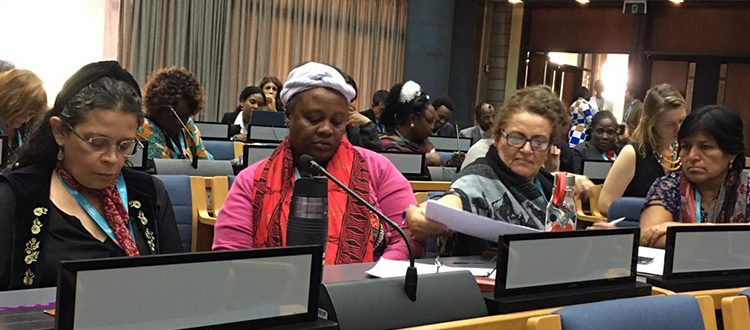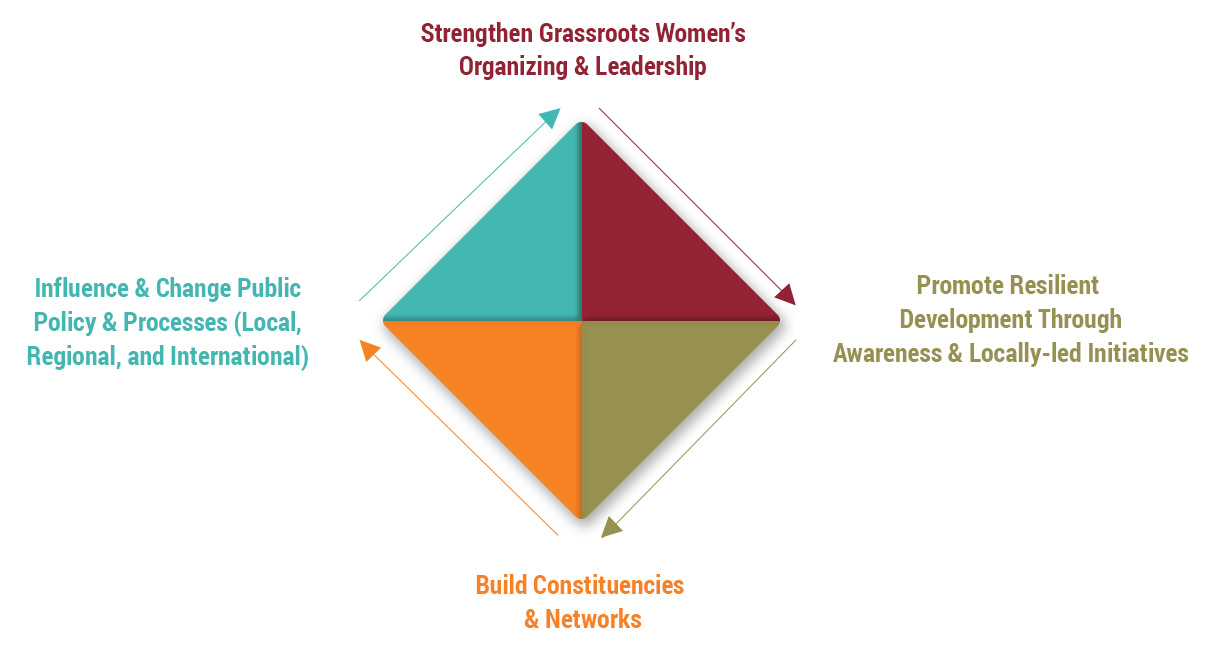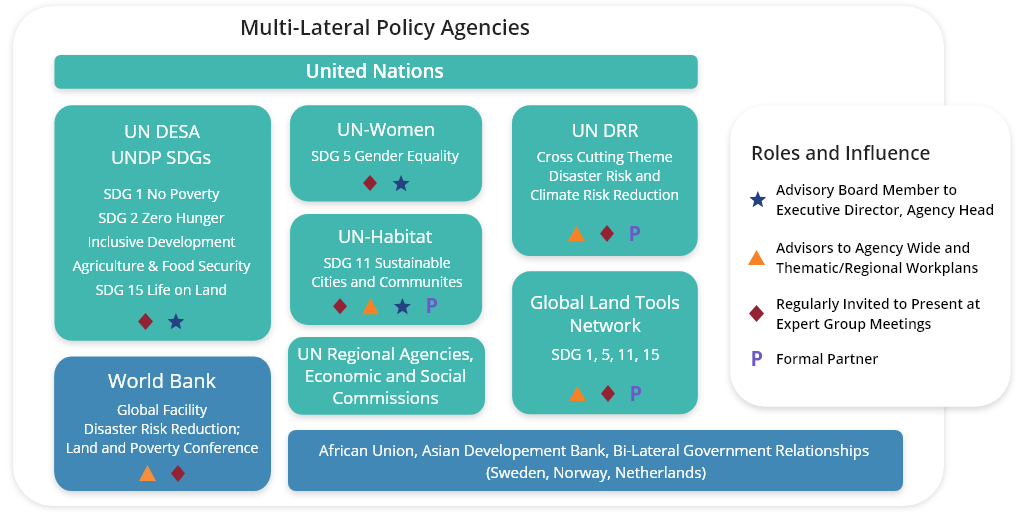GLOBAL POLICY ENGAGEMENT
Global Policy Engagement
Since the 4th World Women’s Conference in Beijing in 1995, the Huairou Commission has advocated for grassroots women’s empowerment through international development frameworks. Since the 2nd UN Conference on Human Settlements (Habitat II) in 1996 – we are working to put grassroots women in the central role of the global development processes, especially relating to the human settlements agenda and resilience building.
Positioning grassroots women leaders in high profile speaking roles has played an instrumental role in strengthening women’s leadership capacities through sharpening their skills in communicating their work and achievements – practices, solutions and tools – to senior policy makers. In following the consultations and implementation of international agreements, leaders of grassroots women’s groups are better informed of the commitments their national governments have made to those policies and are better equipped to advocate for accountability nationally and locally. Moreover, recognition of grassroots women as experts in the global policy processes, trickles down networking and partnership opportunities nationally and regionally.
” Using Gender Evaluation Criteria at the Global Land Tool Network to access the customary land entitlements had shed light to my work in Ghana, giving the platform to talk about these issues with local and national government partners. The UN engagement has been a platform to propel what we have been doing with grassroots women and strengthen women’s lands rights advocacy. We are proud of recognition of our voices and issues at UN Habitat and UN Women spaces.” – Fati Al-Hassan, Grassroots Sisterhood Foundation, Ghana.

Over the years, grassroots women leaders gained recognition as leaders and experts in a variety of roles and advisory positions at the global level, recognizing the vital role of community-based leaders in influencing global policies and priorities. Spaces occupied by grassroots women leaders from our network at the global, regional and national levels include: UN Women’s Civil Society Advisory Group, the International Advisory Board of UN-Habitat’s Global Land Tools Network (GLTN), UN-Habitat’s Advisory Group of Gender Issues (AGGI).
Our Goals and Strategies
Huairou Commission’s policy engagement is key aspect of its theory of change – the “Movement Building Resilient Diamond – consists of four domains that are mutually reinforcing and instrumental to advancing one another:

In turn, our policy engagements serve to build partnerships and coalitions, to gain more recognition to local development solutions in expert, policy and financing frameworks, and to enhance grassroots women’s leadership.
Build partnerships and coalitions
We work to secure formal space and recognition for grassroots women’s groups in development policy circles. We use policy spaces, such as the UN DDR Stakeholder Engagement Mechanism Advisory group to work with other constituencies and civil society partners to identify common interests in supporting grassroots and plan for joint engagement and advocacy. We take advantage of the policy spaces to engage high-level partners to champion grassroots action.
Gain recognition for women led local development solutions in expert, policy and financing frameworks
We bring grassroots women’s perspectives, practices and solutions to different expert spaces under the Agenda 2030 frameworks. The grassroots women leaders participate in Expert Group Meetings Consultations convened by development agencies to contribute to the monitoring of global frameworks, development of programmes, and to demonstrate the added value of community data collection and other tools to delivering the ambitions of “leaving no one behind” within the Agenda 2030.
Enhance grassroots women’s leadership
Huairou’s grounding principle in policy engagements is to let grassroots women speak for themselves. We bring grassroots women to key policy processes and support their engagement at regional and global policy levels so they can pursue alliances that can benefit their local and national level work, can grow as leaders familiar with high level policy spaces and actors, can better position themselves as partners, and can advance the dialogue by bringing their capacities and knowledge to the table.
In addition to the strategic use of policy spaces to advance our Theory of Change, we bring consistent but contextually tailored policy and advocacy messages to each of the spaces. These messages specifically target development governance areas that need to change to realize the global development framework such as Agenda 2030 vision of building resilient communities and leaving no one behind.
Global Organizing and Movement Building
Huairou Commission takes advantage of global gatherings to convene International Global Grassroots Academies and caucuses where community practitioners are able to share their experiences and collectively plan common messages and outreach strategies that advance implementation of inclusive, bottom-up approaches to building resilience.
International fora such as the Global Platform for Disaster Risk Reduction (organized by UN DRR), World Urban Forum and Habitat Assembly (organized by UN Habitat), the Commision on the Status of Women (organized by the UN Women) and the High Level Political Forum for Sustainable Development (organized by the ECOSOC) play an important role in movement building. Alongside opportunities to meet and form relationships with new allies and partners, engagement in these fora provides Huairou Commission an important entry point for mobilizing a larger constituency of community practitioners to press for and support government’s commitments to community-led, inclusive sustainable development.

